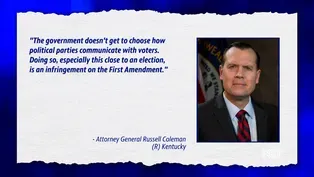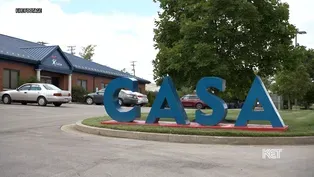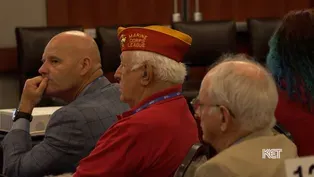
In Conversation with State's Top Higher-Education Official
Clip: Season 3 Episode 65 | 8m 23sVideo has Closed Captions
Education talk with President of Kentucky Council on Postsecondary Education.
Aaron Thompson, president of the Kentucky Council on Postsecondary Education, talks with Renee Shaw.
Problems with Closed Captions? Closed Captioning Feedback
Problems with Closed Captions? Closed Captioning Feedback
Kentucky Edition is a local public television program presented by KET

In Conversation with State's Top Higher-Education Official
Clip: Season 3 Episode 65 | 8m 23sVideo has Closed Captions
Aaron Thompson, president of the Kentucky Council on Postsecondary Education, talks with Renee Shaw.
Problems with Closed Captions? Closed Captioning Feedback
How to Watch Kentucky Edition
Kentucky Edition is available to stream on pbs.org and the free PBS App, available on iPhone, Apple TV, Android TV, Android smartphones, Amazon Fire TV, Amazon Fire Tablet, Roku, Samsung Smart TV, and Vizio.
Providing Support for PBS.org
Learn Moreabout PBS online sponsorshipAnother.
A public university in Kentucky is shuttering its office related to diversity, equity and inclusion, or what is commonly called d-r.i. Northern Kentucky University President Katie Short Thompson announced the news yesterday in an email, according to the Lexington Herald-Leader.
The email said NCCU will dissolve its Office of Inclusive Excellence.
The announcement follows the resignation of Nbcu's Chief diversity officer.
Earlier this month, the University of Kentucky announced it was dissolving its Office for Institutional Diversity.
Presidents of both universities said their decisions follow failed legislative efforts that they expect to resurface next year to curtail or even prohibit D-I programs in Kentucky universities.
Today, I asked Erin Thompson, who's president of the Kentucky Council on Postsecondary Education, about the possible impacts of these decisions and our Education Matters segment.
President Thompson, thank you for being with us.
We appreciate it.
Thank you, Renee.
Always good to be with you on any show that you have.
Well, we're glad to have you on this one.
Let's talk about the recent developments this week with Northern Kentucky University now becoming the second public higher ed institution that has said it is dissolving their diversity offices.
Talk to us about do you expect other universities to follow suit and what potential impacts could this have?
A very fair question.
My guess is that others will.
Some have already.
To be honest with you, I think several of our institutions have already dispersed those offices throughout campuses.
You know, I wasn't surprised at northern UK, obviously, as our flagship.
And it was by far the most one that people have heard about and actually talked about.
But yes, I think the point that I'm really interested in is how then do we make sure that we are serving all of our students, even those underrepresented populations who use those offices as a point of contact?
Right.
And so but, you know, you know, what happened last year and even sometimes before that, there's there were some political concerns around those offices and mandatory training, even though I don't think many of our campuses did mandatory training and maybe our officers didn't even do the things that I think that people assumed that were being done.
But what we do know is they were serving students.
And so the point that I would want to make as the head of higher education is as we move forward, how do we continue to serve those students that we serve fairly well, If you look at the last five years and how we're closing gaps.
Well, and this has been one of your priorities since you were selected as the president of the Kentucky Council on Postsecondary Education are closing those academic achievement gaps and helping underage presented minority groups.
And that's not always a black and white issue, as we have discussed in many, many occasions.
But talk about how the if there is a connection between the closure of these diversity offices to the academic achievement of underrepresented groups.
Well, it's a very fair question, and we should be asking that question, and we're not concentrating on that and we're not doing what we need to do.
And let me set it up as as the person who the head of higher education who's overseeing a lot of the strategy for Kentucky.
I represent Kentucky.
And what I know is, Renee, that in Kentucky, if we don't get more people prepared with a college credential of some sort to be a part of this economy, we're not doing the kind of strategies we need to do.
Those offices have stood as a part of those.
As a matter of fact.
And I don't think we were I don't think we did anything illegal in those processes.
The item that I know is that if you look at what has taken place in Kentucky, our strategy is to help all students.
And we have been, please understand, number two in the country and credentials across the board.
We're also understanding that we've had good enrollment over the last several years.
Much of that enrollment has been increased by underrepresented minority populations.
So when we talk about those things around the eye, we talk about low income, too, something we haven't done nearly as well on that we need to do better.
And so strategies have to focus on that.
They have to focus on the adults.
They have to focus on people with disabilities.
They have to focus on all of that.
And all those fall within those categorical areas of the.
Yeah, as we discussed.
But these offices actually serve as a point of contact for many people who felt disenfranchized from our college campuses.
Right.
I mean.
And that means what and whom?
Well, it means that if you look at Gap, I'll just use something really simplistic in thinking about this.
If you look at just the achievement gaps that's happening in our K-12 and higher ed, the gaps are farther apart between our majority populations and minority populations.
Right.
And so what happens is on a college campus is that we get those students, and most of us serve fairly open enrollment, right?
When we get those students, we have to give them what they need.
I'm from eastern Kentucky and I'm proud of that.
But I also know that in many cases are low income and other folks need that kind of help, too, and that focus on really taking a student where she or he is at and giving them what they need to be successful adds to our economy.
They're going to get jobs, pay taxes.
They're not going to probably end up in prisons, which is a correlation between lack of education.
And they're probably not going to be on Medicaid, which is a high correlation.
So our goal is to do it all.
And I'm proud to say that we've done a good job in this state, actually top in the nation of closing those gaps.
It's not doing anything super extra, but we don't give somebody else.
We're giving everybody what they need, but we're understanding where they're coming from.
So with these officers not being there, I don't know what will happen or have them future enrollment.
We don't know.
But we're called now.
All of us, myself, the presidents, whether it's at Northern UK, Gravelle or wherever it may be, to say, how do we make sure that we continue to serve even though we may not have these offices?
How do we make sure that students don't feel as if they're not getting what they need to be successful?
The performance based funding model is somewhat based on the ability of universities to demonstrate that they have some intentionality and success and closing these gaps.
Right?
Right.
What does these actions do to that imperative that the CPE is set forth?
Yes.
As you well know, last year, the attorney general said that our uranium definition was underrepresented.
Minorities represented minorities.
Thank you.
Was unconstitutional.
We shouldn't use that.
So the Senate and the House passed the bill that says with our performance funding, we all that we had to come back this year and we're meeting for the first time next week to read to find underrepresented.
We can no longer use the minority piece of it, but redefine what it is.
And we're in that process now.
But we have to also understand our performance funding model.
The biggest part is what we do for all students to get them ready, but we also have a shortage in our STEM science, technology, engineering and math areas.
And so that's a part of it too.
So we're doing we're giving them money to help build that out.
We're giving them money to help build low income out, giving them money to help build first generation and now adult learners, which we need to sooner or later, we're going to have to concentrate on how we get more men back in higher education, believe it or not.
Because females are outpacing them.
Not only females are a patient and we want to help females.
I didn't mean we've sure.
But what we also know is there's a dearth, there's a gap, and we better figure out what it is.
Or Kentucky want continue to be a robust economy if we don't do that.
So the way we approach all of this, what are the strategies that are need that help them to have access to that higher education degree?
And how do we help them to get through to that finish line as fast as they can, as the most affordable?
We can make sure it happens for them.
All of those pieces have to be still in place.
If not, we won't continue to grow as we're growing.
Yeah.
Well, Dr. Aaron Thompson, thank you so much.
We appreciate a few minutes of your time.
Thank you so much, Renee, as alw
Around the Commonwealth (8/30/2024)
Video has Closed Captions
Clip: S3 Ep65 | 3m 5s | Events happening around the state. (3m 5s)
Campaigning and Constitutional Amendments
Video has Closed Captions
Clip: S3 Ep65 | 1m 18s | Attorney general weighs in on constitutional amendment campaigning. (1m 18s)
CASA of the Appalachian Mountains
Video has Closed Captions
Clip: S3 Ep65 | 3m 41s | New CASA branch in need of volunteers. (3m 41s)
Kentucky Department of Veterans Affairs Conference
Video has Closed Captions
Clip: S3 Ep65 | 4m 27s | Leaders of Kentucky veterans service organizations discuss issues facing veterans. (4m 27s)
Video has Closed Captions
Clip: S3 Ep65 | 1m 51s | National Corvette Museum celebrates milestone. (1m 51s)
Providing Support for PBS.org
Learn Moreabout PBS online sponsorshipSupport for PBS provided by:
Kentucky Edition is a local public television program presented by KET
















